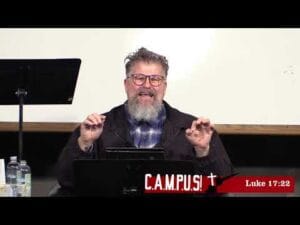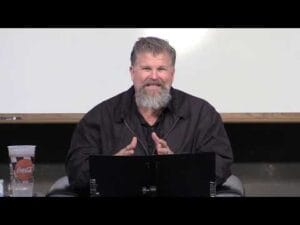
Philippians 4:6-23 Bible Teaching
Paul's message to the Philippians emphasizes joy, moderation, and contentment through Christ's strength. Shawn highlights Christ's imminent return, urging preparedness and trust in God.

Paul's message to the Philippians emphasizes joy, moderation, and contentment through Christ's strength. Shawn highlights Christ's imminent return, urging preparedness and trust in God.

Salvation requires faith in Jesus, not just good deeds. True goodness is God's alone. Wealth can hinder spiritual growth. Eternal life needs divine grace, not human effort.

Paul emphasizes spiritual living over earthly desires, warns against false teachers, highlights heavenly citizenship, anticipates Christ's return, and promotes unity in the church.

Luke 18 teaches persistent prayer, humility, childlike faith, and contrasts self-righteousness with humble contrition. Emphasizes justice, patience, and God's timing.

Shawn's teaching emphasizes faith in Jesus for justification and sanctification, leading to genuine works. Paul uses race metaphors for spiritual perseverance and growth.

Shawn's teaching on Luke 17:22-end warns of false prophets, emphasizes vigilance, compares end times to Noah and Lot, and discusses the sudden return of Jesus.

Faith is foundational, enabling love and forgiveness. Jesus teaches faith's power, humility, gratitude, and the internal Kingdom of God, emphasizing spiritual over ritual.

Paul stresses rejoicing in Christ, rejecting reliance on personal credentials for righteousness. True worship is through faith, knowing Christ's value, and divine righteousness.

Shawn's teaching on the parable of the rich man and Lazarus highlights the contrast between earthly wealth and spiritual fulfillment, emphasizing repentance, forgiveness, and genuine faith.

Lead a Christ-like life by avoiding complaints, shining as God's children, and holding onto the "word of life." Paul and Timothy exemplify dedication and self-sacrifice.

Paul and Shawn teach salvation as a journey of faith, not law, emphasizing God's role and personal responsibility. Live righteously, avoid false teachings, and practice love and humility.

Jesus teaches the impossibility of serving both God and wealth, using the parable of the rich man and Lazarus to illustrate spiritual consequences and the importance of prioritizing God over material desires.

The teaching contrasts the prodigal son's parable with the unjust steward's, highlighting themes of grace, forgiveness, accountability, and wise use of resources for spiritual growth.

Paul's letter to Philippians emphasizes Jesus' humility and obedience, Shawn's teaching highlights redemption through Christ's death, and the promise of eternal life.

Paul's teaching in Philippians 2:6-11 highlights Christ's humility, choosing servitude and death over divine privilege, emphasizing humility and obedience for believers.

Luke 15's parables of the lost sheep, coin, and prodigal son highlight repentance, redemption, and joy, emphasizing God's joy in sinners' repentance and the value of individual restoration.

Shawn's teaching uses Jesus' parable of a great feast to illustrate the Kingdom of God, emphasizing humility, service, open invitation, and prioritizing faith over worldly ties.

Paul urges Philippians to unity through humility, love, and shared purpose, inspired by Christ's example. Emphasizes selflessness, spiritual fellowship, and agape love.

Jesus challenges Pharisees' Sabbath views by healing, teaching compassion over legalism. Emphasizes humility, inviting marginalized, promising divine rewards over earthly.

Paul: Unity, personal conduct, faith's eternal aspects. Shawn: Discern spirits, mind of Christ, faith beyond reason. Both: Suffering, humility, shared belief, love, servitude.